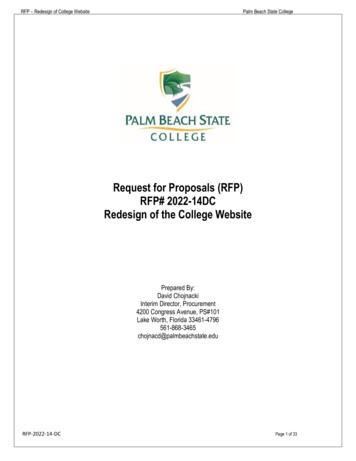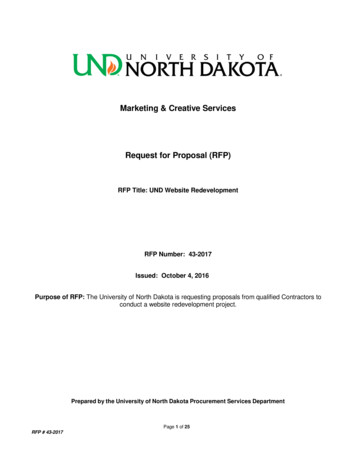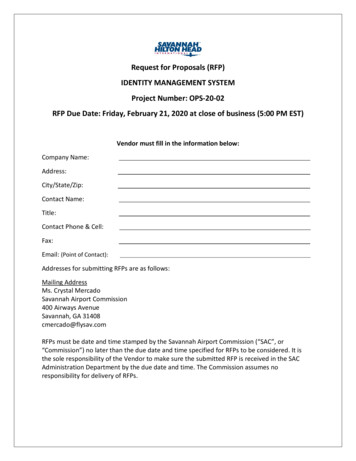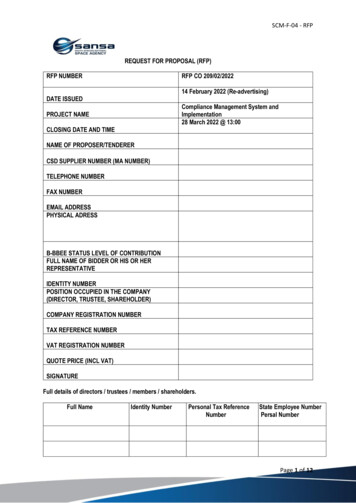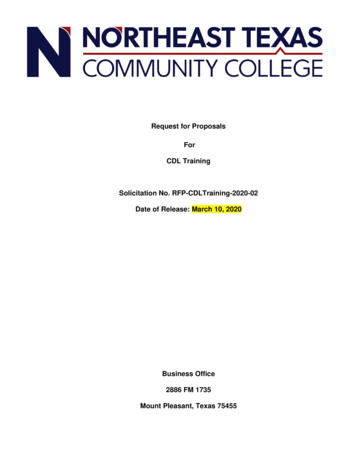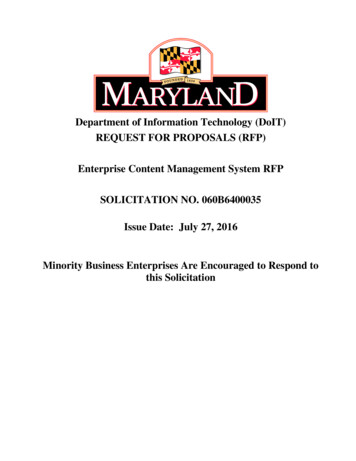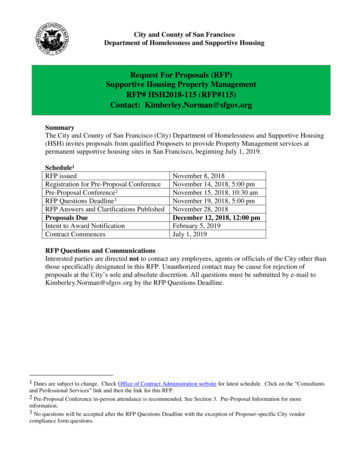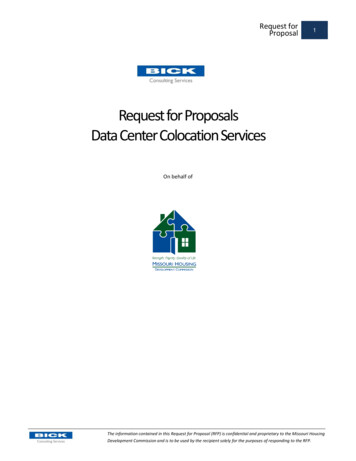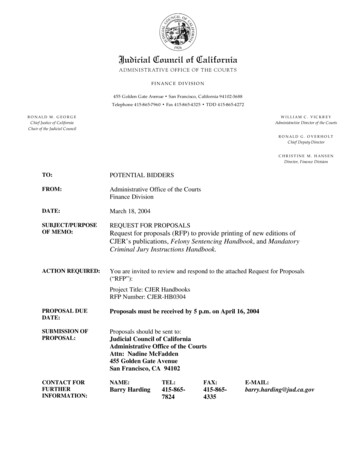
Transcription
FINANCE DIVISION. San Francisco, California 94102-3688Telephone 415-865-7960 . Fax 415-865-4325 . TDD 415-865-4272455 Golden Gate AvenueRONALD M. GEORGEWILLIAM C. VICKREYChief Justice of CaliforniaChair of the Judicial CouncilAdministrative Director of the CourtsRONALD G. OVERHOLTChief Deputy DirectorCHRISTINE M. HANSENDirector, Finance DivisionTO:POTENTIAL BIDDERSFROM:Administrative Office of the CourtsFinance DivisionDATE:March 18, 2004SUBJECT/PURPOSEOF MEMO:REQUEST FOR PROPOSALSACTION REQUIRED:Request for proposals (RFP) to provide printing of new editions ofCJER’s publications, Felony Sentencing Handbook, and MandatoryCriminal Jury Instructions Handbook.You are invited to review and respond to the attached Request for Proposals(“RFP”):Project Title: CJER HandbooksRFP Number: CJER-HB0304PROPOSAL DUEDATE:Proposals must be received by 5 p.m. on April 16, 2004SUBMISSION OFPROPOSAL:Proposals should be sent to:Judicial Council of CaliforniaAdministrative Office of the CourtsAttn: Nadine McFadden455 Golden Gate AvenueSan Francisco, CA 94102CONTACT FORFURTHERINFORMATION:NAME:TEL:FAX:E-MAIL:Barry gov
Project Title: CJER HandbooksRFP Number: CJER-HB03041.0GENERAL INFORMATION1.1BackgroundThe Judicial Council of California, chaired by the Chief Justice of California, isthe chief policy making agency of the California judicial system. The CaliforniaConstitution directs the Council to improve the administration of justice bysurveying judicial business, recommending improvements to the courts, andmaking recommendations annually to the Governor and the Legislature. TheCouncil also adopts rules for court administration, practice, and procedure, andperforms other functions prescribed by law. The Administrative Office of theCourts (AOC) is the staff agency for the Council and assists both the Council andits chair in performing their duties.1.2Background of CJER PublicationsThe California Center for Judicial Education and Research (CJER), as theEducation Division of the AOC, is responsible for developing and maintaining acomprehensive and quality educational program for the California judicial branch.Formed in 1973 as a joint enterprise of the Judicial Council and the CaliforniaJudges Association, CJER supports the Chief Justice, the Judicial Council, and thecourts by providing an extensive statewide educational program for judicialofficers and court staff at both the trial and appellate levels. It includes orientationprograms for new judicial officers, court clerks, and administrative officers;continuing education programs for judicial officers, court administrators, andmanagers; an annual statewide conference for judicial officers and courtadministrators; video and audiotapes; and judicial benchbooks, benchguides, andpractice aids.The publications, Felony Sentencing Handbook and Mandatory Criminal JuryInstructions Handbook, are part of a comprehensive collection of criminal laweducational materials that are distributed by CJER to California judicial officerswithout charge.The Felony Sentencing Handbook is a quick-reference tool for judges withcriminal assignments, and provides a listing of the sentencing terms of allCalifornia felonies, felony sentencing enhancements, and probation restrictions.Thomson West has published the handbook annually for the last eleven (11)years.The Mandatory Criminal Jury Instructions Handbook was first published byCJER in 1976 to provide practical information for judges handling criminalproceedings. For many years, it was published as a special issue of the CJERJournal. Thomson West has published the handbook annually for the last eightyears. The handbook is a quick reference tool, containing a brief summary of thesubstantive law of sua sponte requirements for instruction, a checklist ofmandatory instructions, and a discussion of common instructional errors.The copyright to both handbooks is held by the Judicial Council of California.Rev 12/03Page 2 of 7
Project Title: CJER HandbooksRFP Number: CJER-HB0304By anecdotal evidence, we understand that the Felony Sentencing Handbook andthe Mandatory Criminal Jury Instructions Handbook are well-regarded among thejudiciary.2.0PURPOSE OF THIS RFPThe primary objective of this project is to publish new editions of the Felony SentencingHandbook and Mandatory Criminal Jury Instructions Handbook, and to make copies ofthe new editions available to every California judicial officer. CJER plans to publishrevised editions of each handbook annually. A secondary objective is to make thehandbooks available to the bar at a reasonable cost.For this reason, the Judicial Council is willing to consider an arrangement under whichthe Judicial Council grants a private publisher the right to sell, in print and/or inelectronic format, the Felony Sentencing Handbook and Mandatory Criminal JuryInstructions Handbook to nonjudges, and as consideration, the publisher will print copiesof the handbooks to be distributed to California judicial officers. The Contract Terms, asset forth in Attachment A, would be modified accordingly.The AOC seeks to identify and retain qualified service providers with expertise incommercial publishing. This RFP is the means for prospective service providers tosubmit their qualifications to the AOC and request selection as a service provider.3.0SCOPE OF SERVICES3.1.Services are expected to be performed by the service provider between July 2004and June 2005, with possible options to extend the work for up to two (2)consecutive 1-year options, which would not to exceed a total contract period ofthree (3) years.The projected publication date of the Mandatory Criminal Jury InstructionsHandbook is September 2004. The projected publication date of the FelonySentencing Handbook is March 2005.If first 1-year option to extend work is exercised, the projected publication datesof new editions of the handbooks will be September 2005 (Mandatory CriminalJury Instructions Handbook) and March 2006 (Felony Sentencing Handbook).If second 1-year option to extend work is exercised, the projected publicationdates of new editions of the handbooks will be September 2006 (MandatoryCriminal Jury Instructions Handbook) and March 2007 (Felony SentencingHandbook).3.2.The service provider will be asked to:3.2.1 Print 2,300 copies of each of the new editions of the handbooks fordistribution to California judicial officers in substantially the same sizeand format as the current editions. The current edition of the MandatoryRev 12/03Page 3 of 7
Project Title: CJER HandbooksRFP Number: CJER-HB0304Criminal Jury Instructions Handbook is perfect bound, softcover, 156pages, and approximately 6” by 9.” The current edition of the FelonySentencing Handbook is comb bound, softcover, 94 pages, andapproximately 9” by 6.” Copies of the current editions are available forinspection.If first 1-year option to extend work is exercised, the print run of neweditions of each handbook shall be increased to 2,400 copies.If second 1-year option to extend work is exercised, the print run of neweditions of each handbook shall remain at 2,400 copies.3.2.2 Meet the following production schedule for the Mandatory Criminal JuryInstructions Handbook:CJER will supply the final manuscript of the handbook to the serviceprovider on or about July 1, 2004. The handbook should be typeset andprinted as soon as possible thereafter, but no later than September 1, 2004.If first 1-year option to extend work is exercised, the final manuscriptdelivery date will be July 1, 2005. The typeset and printing deadline willbe September 1, 2005.If second 1-year option to extend work is exercised, the final manuscriptdelivery date will be July 3, 2006. The typeset and printing deadline willbe September 1, 2006.3.2.3 Meet the following production schedule for the Felony SentencingHandbook:CJER will supply the final manuscript of the handbook to the serviceprovider on or about January 2, 2005. The handbook should be typeset andprinted as soon as possible thereafter, but no later than March 1, 2005.If first 1-year option to extend work is exercised, the final manuscriptdelivery date will be January 2, 2006. The typeset and printing deadlinewill be March 1, 2006.If second 1-year option to extend work is exercised, the final manuscriptdelivery date will be January 2, 2007. The typeset and printing deadlinewill be March 1, 2007.3.2.3 Deliver copies of each handbook either (1) in bulk to the Judicial Councilor (2) directly to judicial officers.4.0SPECIFICS OF A RESPONSIVE PROPOSALThe following information shall be included in the proposal:Rev 12/03Page 4 of 7
Project Title: CJER HandbooksRFP Number: CJER-HB03045.04.1Name, address, telephone and fax numbers, and federal tax identification number.4.2Three (3) copies of the proposal signed by an authorized representative of thecompany, including name, title, address, and telephone number of one individualwho is the responder’s designated representative.4.3Resumes describing the background and experience of key staff, as well as eachindividual’s ability and experience in conducting the proposed activities.4.4Describe key staff’s knowledge of the requirements necessary to complete thisproject.4.5Responsive proposals should provide straightforward, concise information thatsatisfies the requirements noted above. Expensive bindings, color displays, andthe like are not necessary or desired. Emphasis should be placed on conformity tothe state’s instructions, requirements of this RFP, and completeness and clarity ofcontent.4.6Estimated production schedules for each handbook.4.7Identification of form in which the final manuscript of each handbook must besupplied to service provider.4.8Typesetting specifications for each handbook.4.9Price of each handbook to be charged to nonjudges (ie., the bar).4.10If contents of handbook distributed to nonjudges in electronic format, the methodof distribution (e.g., online distribution) and access charges to subscribers.4.11Royalty, if any, to be paid to the Judicial Council.COST or FEE PROPOSALThe proposal must outline all potential costs to the Judicial Council in performing theservices requested. Specifically, the following shall be included in the proposal:5.1Amount, if any, to be paid by the Judicial Council for copies of the MandatoryCriminal Jury Instructions Handbook and the Felony Sentencing Handbook in excess ofthe amount to be provided at no cost to California judicial officers.5.2Amount, if any, to be paid by the Judicial Council for the service provider to dropship the handbooks to judicial officers instead of delivering them in bulk to the JudicialCouncil.5.3Rev 12/03Any other costs or fees.Page 5 of 7
Project Title: CJER HandbooksRFP Number: CJER-HB03046.0RIGHTSThe AOC reserves the right to reject any and all proposals, in whole or in part, as well asthe right to issue similar RFPs in the future. This RFP is in no way an agreement,obligation, or contract and in no way is the AOC or the State of California responsible forthe cost of preparing the proposal. One (1) copy of a submitted proposal will be retainedfor official files and becomes a public record.Only written responses will be accepted. Responses should be sent by registered orcertified mail or by hand delivery. The service provider may send the AOC an advancecopy by facsimile to the Project Manager at the fax number listed in Section 7.0, below.However, sending an advance copy by fax does not satisfy the submission requirementsof paragraph 4.2.7.0PROJECT MANAGEMENTThe Project Manager for this RFP process is:Barry HardingEducation DivisionAdministrative Office of the Courts455 Golden Gate AvenueSan Francisco, CA 94102-3660Tel: (415)865-7824Fax: (415) 865-7745E-mail: barry.harding@jud.ca.gov8.0EVALUATION OF PROPOSALSProposals will be evaluated by the AOC using the following criteria, in order ofdescending priority:9.0a.Quality of work plan submittedb.Credentials of staff to be assigned to the projectc.Ability to meet timing requirements to complete the projectd.Ability to comply with RFP requirements.ADDITIONAL REQUIREMENTSIt may be necessary to interview prospective service providers to clarify aspects of theirsubmittal. If conducted, interviews will likely be conducted by telephone conference call.The AOC will notify prospective service providers regarding the interview arrangements.Rev 12/03Page 6 of 7
Project Title: CJER HandbooksRFP Number: CJER-HB030410.0PROPOSED CONTRACT TERMS AND ADMINISTRATIVE RULESContracts with successful firms will be signed by the parties on a State of CaliforniaStandard Agreement form and will include terms appropriate for this project. Terms andconditions typical for the requested services are attached as Attachment A.Incorporated in this RFP, and attached as Attachment B, is a document entitled“Administrative Rules Governing Requests for Proposals.” Service providers shallfollow these rules in preparation of their proposals.11.0CONFIDENTIAL OR PROPRIETARY INFORMATIONThe Administrative Office of the Courts policy is to follow the intent of the CaliforniaPublic Records Act (PRA). If a vendor’s proposal contains material noted or marked asconfidential and/or proprietary that, in the AOC’s sole opinion, meets the disclosureexemption requirements of the PRA, then that information will not be disclosed pursuantto a request for public documents. If the AOC does not consider such material to beexempt from disclosure under the PRA, the material will be made available to the public,regardless of the notation or markings. If a vendor is unsure if its confidential and/orproprietary material meets the disclosure exemption requirements of the PRA, then itshould not include such information in its proposal.Rev 12/03Page 7 of 7
Attachment AContract TermsSTANDARD PROVISIONS1.IndemnificationThe Contractor shall indemnify, defend (with counsel satisfactory to the State), andsave harmless the State and its officers, agents, and employees from any and all claimsand losses accruing or resulting to any and all other contractors, Subcontractors,suppliers, and laborers, and any other person, firm, or corporation furnishing orsupplying Work, Materials, Data, or services in connection with the performance ofthis Agreement, and from any and all claims and losses accruing or resulting to anyperson, firm, or corporation who may be injured or damaged by the Contractor or itsagents or employees in the performance of this Agreement.2.Relationship of PartiesThe Contractor and the agents and employees of the Contractor, in the performance ofthis Agreement, shall act in an independent capacity and not as officers or employeesor agents of the State of California.3.Termination for CauseThe State may terminate this Agreement and be relieved of the payment of anyconsideration to the Contractor if the Contractor fails to perform the provisions of thisAgreement at the time and in the manner provided. If the Agreement is terminated, theState may proceed with the Work in any manner it deems proper. The cost to the Stateto perform this Agreement shall be deducted from any sum due the Contractor underthis Agreement or any other agreement, and the balance, if any, shall be paid to theContractor upon demand.4.No AssignmentWithout the written consent of the State, the Contractor shall not assign thisAgreement in whole or in part.5.Time of EssenceTime is of the essence in this Agreement.6.Validity of AlterationsAlteration or variation of the terms of this Agreement shall not be valid unless made inwriting and signed by the parties, and an oral understanding or agreement that is notincorporated shall not be binding on any of the parties.Rev 12/03Page 1 of 16
Attachment AContract Terms7.ConsiderationThe consideration to be paid to the Contractor under this Agreement shall becompensation for all the Contractor's expenses incurred in the performance of thisAgreement, including travel and per diem, unless otherwise expressly provided.SPECIAL PROVISIONS1.DefinitionsTerms defined below and elsewhere throughout the Contract Documents shall apply tothe Agreement as defined.Rev 12/03A.“Administrative Director” refers to that individual, or authorized designee,empowered by the State to make final and binding executive decisions onbehalf of the State.B.“Amendment” means a written document issued by the State and signed by theContractor which alters the Contract Documents and identifies the following:(1) a change in the Work; (2) a change in Contract Amount; (3) a change intime allotted for performance; and/or (4) an adjustment to the Agreement terms.C.“Confidential Information” means trade secrets, financial, statistical,personnel, technical, and other Data and information relating to the State’sbusiness or the business of its constituents. Confidential Information does notinclude (i) information that is already known by the receiving party, free ofobligation of confidentiality to the disclosing party; (ii) information thatbecomes generally available to the public, other than as a result of disclosure bythe receiving party in breach of this Agreement; (iii) information that isindependently developed by the receiving party without reference to theConfidential Information; and (iv) information that the receiving partyrightfully obtains from a Third Party free of the obligation of confidentiality tothe disclosing party.D.The “Contract” or “Contract Documents” constitute the entire integratedagreement between the State and the Contractor, as attached to and incorporatedby a fully executed State Standard Agreement form. The terms “Contract” or“Contract Documents” may be used interchangeably with the term“Agreement.”E.The “Contractor” means the individual, association, partnership, firm,company, consultant, corporation, affiliates, or combination thereof, includingjoint ventures, contracting with the State to do the Contract Work. TheContractor is one of the parties to this Agreement.Page 2 of 16
Attachment AContract TermsF.“Data” means all types of raw data, articles, papers, charts, records, reports,studies, research, memoranda, computation sheets, questionnaires, surveys, andother documentation.G.“Day” means calendar day, unless otherwise specified.H.“Deliverable(s)” or “Submittal(s)” means one or more items, if specified in theContract Documents, that the Contractor shall complete and deliver or submit tothe State for acceptance.I.“Force Majeure” means a delay which impacts the timely performance ofWork which neither the Contractor nor the State are liable because such delayor failure to perform was unforeseeable and beyond the control of the party.Acts of Force Majeure include, but are not limited to:i.ii.iii.iv.v.vi.J.“Material” means all types of tangible personal property, including but notlimited to goods, supplies, equipment, commodities, and information andtelecommunication technology.K.“Notice” means a written document initiated by the authorized representative ofeither party to this Agreement and given by:i.ii.Rev 12/03Acts of God or the public enemy;Acts or omissions of any government entity;Fire or other casualty for which a party is not responsible;Quarantine or epidemic;Strike or defensive lockout; and,Unusually severe weather conditions.Depositing in the U. S. Mail (or approved commercial express carrier)prepaid to the address of the appropriate authorized representative of theother party, which shall be effective upon date of receipt; orHand-delivered to the other party’s authorized representative, which shallbe effective on the date of service.L.“Project” refers to all activity relative to this Agreement including activity ofthe Contractor, its Subcontractors, the State and the State’s representatives.M.The “State” refers to the Judicial Council of California / Administrative Officeof the Courts (“AOC”). The State is one of the parties to this Agreement. Theterm “State” shall also include any individual designated to perform technicaland/or administrative functions, as set forth herein.N.“State Standard Agreement” means the form used by the State to enter intoagreements with other parties. Several originally signed, fully executedPage 3 of 16
Attachment AContract Termsversions of the State Standard Agreement, together with the integrated ContractDocuments, shall each represent the Agreement as an individual “ContractCounterpart.”2.O.“Stop Work Order” means the written Notice, delivered in accordance withthis Agreement, by which the State may require the Contractor to stop all, orany part, of the Work of this Agreement, for the period set forth in the StopWork Order. The Stop Work Order shall be specifically identified as such andshall indicate that it is issued pursuant to the Stop Work provision in the SpecialProvisions.P.“Subcontractor” shall mean an individual, firm, partnership, or corporationhaving a contract, purchase order, or agreement with the Contractor, or with anySubcontractor of any tier for the performance of any part of the Agreement.When the State refers to Subcontractor(s) in this document, for purposes of thisAgreement and unless otherwise expressly stated, the term “Subcontractor”includes, at every level and/or tier, all subcontractors, sub-consultants,suppliers, and materialmen.Q.“Task(s)” means one or more functions, if specified in the Contract Documents,to be performed by the Contractor for the State.R.“Third Party” refers to any individual, association, partnership, firm,company, corporation, consultant, Subcontractor, or combination thereof,including joint ventures, other than the State or the Contractor, which is not aparty to this Agreement.S.“Work” or “Work to be Performed” or “Contract Work” may be usedinterchangeably to refer to the service, labor, Materials, Data, and other itemsnecessary for the execution, completion and fulfillment of the Agreement by theContractor to the satisfaction of the State. Work may be defined to includeTasks, Deliverables, and/or Submittals, as required by the Contract.Manner of Performance of WorkThe Contractor shall complete all Work specified in these Contract Documents to theState's satisfaction and in compliance with the Special Provisions Nondiscrimination /No Harassment Clause.3.Termination Other Than for CauseA.Rev 12/03In addition to termination for cause under Standard Provisions paragraph 3, theState may terminate this Agreement at any time upon providing the Contractorwritten Notice at least ten (10) Days before the effective date of termination.Upon receipt of the termination Notice, the Contractor shall promptlydiscontinue all services affected unless the Notice specifies otherwise.Page 4 of 16
Attachment AContract TermsB.4.If the State terminates all or a portion of this Agreement other than for cause,the State shall pay the Contractor for the fair value of satisfactory servicesrendered before the termination, not to exceed the total Contract Amount.State's Obligation Subject to Availability of FundsA.The State's obligation under this Agreement is subject to the availability ofauthorized funds. The State may terminate the Agreement or any part of theContract Work, without prejudice to any right or remedy of the State, for lackof appropriation of funds. If expected or actual funding is withdrawn, reducedor limited in any way prior to the expiration date set forth in this Agreement, orin any Amendment hereto, the State may terminate this Agreement in whole orin part, upon written Notice to the Contractor. Such termination shall be inaddition to the State's rights to terminate for convenience or default.B.Payment shall not exceed the amount allowable for appropriation byLegislature. If the Agreement is terminated for non-appropriation:i.ii.C.5.Funding for this Agreement beyond the current appropriation year isconditional upon appropriation by the Legislature of sufficient funds to supportthe activities described in this Agreement. Should such an appropriation not beapproved, the Agreement may terminate at the close of the currentappropriation year. The appropriation year ends on June 30 of each year.Stop WorkA.The State may, at any time, by written Notice to the Contractor, require theContractor to stop all, or any part, of the Work of this Agreement, for a periodup to ninety (90) Days after the Notice is delivered to the Contractor, and forany further period to which the parties may agree (“Stop Work Order”). TheStop Work Order shall be specifically identified as such and shall indicate it isissued under this provision. Upon receipt of the Stop Work Order, theContractor shall immediately comply with its terms and take all reasonablesteps to minimize the incurrence of costs allocable to the Work covered by theStop Work Order during the period of Work stoppage. Within a period ofninety (90) Days after a Stop Work Order is delivered to the Contractor, orwithin any extension of that period to which the parties shall have agreed, theState shall either:i.Rev 12/03The State will be liable only for payment in accordance with the terms ofthis Agreement for services rendered prior to the effective date oftermination; andThe Contractor shall be released from any obligation to provide furtherservices pursuant to the Agreement as are affected by the termination.Cancel the Stop Work Order; orPage 5 of 16
Attachment AContract Termsii.B.If a Stop Work Order issued under this provision is canceled or the period of theStop Work Order or any extension thereof expires, the Contractor shall resumeWork. The State shall make an equitable adjustment in the delivery schedule,the Contract Amount, or both, and the Agreement shall be modified, in writing,accordingly, if:i.ii.6.Terminate the Work covered by the Stop Work Order as provided for ineither of the termination provisions of this Agreement.The Stop Work Order results in an increase in the time required for, or inthe Contractor’s cost properly allocable to the performance of any part ofthis Agreement; andThe Contractor asserts its right to an equitable adjustment within thirty(30) Days after the end of the period of Work stoppage; however, if theState decides the facts justify the action, the State may receive and actupon a proposal submitted at any time before final payment under thisAgreement.C.If a Stop Work Order is not canceled and the Work covered by the Stop WorkOrder is terminated in accordance with the Termination Other Than For Causeprovision or the State’s Obligation Subject to Availability of Funds provision, asset forth in the Special Provisions, the State shall allow reasonable costs resultingfrom the Stop Work Order in arriving at the termination settlement.D.The State shall not be liable to the Contractor for loss of profits because of theStop Work Order issued under this provision.Agreement Administration/CommunicationA.Under this Agreement, the Project Manager, Barry Harding, shall monitor andevaluate the Contractor's performance. All requests and communications aboutthe Work to be Performed under this Agreement shall be made through theProject Manager. Any Notice from the Contractor to the State shall be inwriting and shall be delivered the Project Manager as follows:Barry Harding, Project ManagerJudicial Council of CaliforniaAdministrative Office of the CourtsEducation Division455 Golden Gate AvenueSan Francisco, CA 94102-3660B.Notice to the Contractor shall be directed in writing to:Rev 12/03Page 6 of 16
Attachment AContract Terms7.Standard of ProfessionalismThe Contractor shall conduct all work consistent with professional standards for theindustry and type of work being performed under the Agreement.8.Acceptance of the WorkA.The Project Manager shall be responsible for the sign-off acceptance of all theWork required and submitted pursuant to this Agreement. Prior to approval ofthe Work and prior to approval for payment, the Project Manager will apply theacceptance criteria set forth in subparagraph B of this provision, as appropriate,to determine the acceptability of the Work provided by the Contractor.Unsatisfactory ratings will be resolved as set forth in this provision.B.Acceptance Criteria for Work (“Criteria”) provided by the Contractor pursuantto this Agreement:i.ii.iii.Rev 12/03Timeliness: The Work was delivered on time;Completeness: The Work contained the Data, Materials, and featuresrequired in the Contract; andTechnical accuracy: The Work is accurate as measured againstcommonly accepted standard (for instance, a statistical formula, anindustry standard, or de facto marketplace standard).C.The Contractor shall provide the Work to the State, in accordance with directionfrom the Project Manager. The State shall accept the Work, provided theContractor has delivered the Work in accordance with the Criteria. The ProjectManager shall use the Acceptance and Signoff Form, provided as Attachmentto this Agreement, to notify the Contractor of the Work’s acceptability.D.If the State rejects the Work provided, the Project Manager shall submit to theContractor a written rejection using Attachment , the Acceptance and SignoffForm, describing in detail the failure of the Work as measured against theCriteria. If the State rejects the Work, then the Contractor shall have a periodof ten (10) business days from receipt of the Notice of rejection to correct thestated failure(s) to conform to the Criteria.E.If the Project Manager requests further change, the Contractor shall meet withthe Project Manager, within three (3) business days of such request, to discusschanges for the final submission of the Work. The Contractor shall provide theWork within three (3) business days after this meeting, at which time the Workwill be accepted or the question of its acceptability referred to thePage 7 of 16
Attachment AContract TermsAdministrative Director of the AOC and a principal of the Contractor, as setforth in subparagraph F below.F.9.Rev 12/03If agreement cannot be reached between the Project Manag
the Mandatory Criminal Jury Instructions Handbook are well-regarded among the judiciary. 2.0 PURPOSE OF THIS RFP The primary objective of this project is to publish new editions of the Felony Sentencing Handbook and Mandatory Criminal Jury Instructions Handbook, and to make copies of the new editions available to every California judicial officer.
